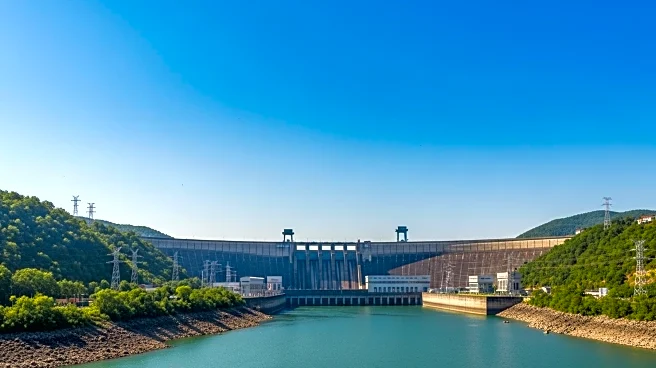What is the story about?
What's Happening?
Ethiopia has announced the completion of the Grand Ethiopian Renaissance Dam (GERD), Africa's largest hydropower project, which began construction in 2011. The dam, located on the Blue Nile River, is expected to generate 6,000 megawatts of electricity and hold over 70 billion cubic meters of water. Ethiopian Prime Minister Abiy Ahmed emphasized the dam as a symbol of regional cooperation, assuring neighboring countries Egypt and Sudan that the project poses no threat but offers shared opportunities. Despite Ethiopia's reassurances, Egypt and Sudan have expressed concerns about potential risks to downstream states, citing violations of international law and threats to regional stability.
Why It's Important?
The completion of GERD is significant for Ethiopia's energy and economic development, potentially transforming the region's power dynamics. The dam promises to enhance agricultural productivity and water conservation, benefiting Ethiopia and its neighbors. However, it also challenges historical agreements favoring Egypt's control over Nile River resources, which could lead to diplomatic tensions. The project underscores the need for collaborative water management among Nile Basin countries, impacting regional politics and international relations. Ethiopia's commitment to shared progress highlights the potential for cooperative development, but also the complexities of balancing national interests with regional stability.
What's Next?
Ethiopia has extended an invitation to Nile Basin countries to celebrate the dam's completion, signaling a willingness to engage in dialogue and cooperation. The governments of Egypt and Sudan may continue diplomatic efforts to address their concerns, potentially seeking international mediation or adjustments to existing agreements. The dam's impact on water flow and resource allocation will likely be monitored closely, with potential for further negotiations on shared water usage. Ethiopia's call for joint investment in regional projects could foster collaboration, but also requires careful management of competing interests and historical grievances.
Beyond the Headlines
The GERD project highlights broader issues of water politics and resource management in Africa, where access to water is crucial for development and stability. The dam's completion may inspire other African nations to pursue self-funded infrastructure projects, promoting economic independence and regional cooperation. However, it also raises ethical questions about equitable resource distribution and the environmental impact of large-scale projects. The situation underscores the importance of sustainable development practices and the need for inclusive decision-making processes that consider the needs of all stakeholders.
















